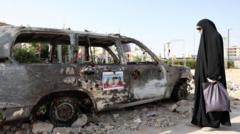Amid the United States' plan to admit Afrikaners as refugees, South Africa's foreign ministry decries the proposal, asserting it undermines the nation's democracy and disputing claims of widespread racial discrimination.
South Africa Condemns US Plan for Afrikaner Refugee Resettlement

South Africa Condemns US Plan for Afrikaner Refugee Resettlement
The South African government criticizes the potential resettlement of white Afrikaners in the US, labeling the move as politically charged.
South Africa has voiced strong objections against the United States' plans to resettle white Afrikaners as refugees, following reports suggesting that this initiative could commence as soon as next week. A document obtained by CBS News indicates that the resettlement of Afrikaners has become a "priority" for the Trump administration, although the exact timeline for these actions remains unverified by the White House.
In a statement released by the South African foreign ministry, officials condemned the proposed refugee resettlement as "politically motivated," alleging that it seeks to destabilize the nation’s "constitutional democracy." Back in February, President Trump had characterized Afrikaners as victims of "racial discrimination" in an executive order that opened the door for their immigration to the US.
While South African authorities clarify they won’t obstruct those selected for resettlement, they insist on receiving guarantees from American officials that all candidates have undergone comprehensive vetting and have no unresolved criminal charges. Moreover, the South African government has rigorously disputed the notion that the country’s white minority faces discrimination, pointing out that crime statistics fail to show any racial targeting in violent farm attacks.
Conversely, some advocacy groups for white farmers argue that there exists a deliberate campaign against them based on race. A spokesperson for the US State Department confirmed that they are in the process of interviewing individuals who express interest in resettlement, prioritizing those, including Afrikaners, claiming to be victims of "unjust racial discrimination," yet they refrained from confirming the start date of the resettlement program.
Additionally, the Trump administration has frequently accused South Africa of seizing land from white farmers without compensation, a claim that the South African government has consistently denied, countering these assertions with their own perspectives on racism and land issues in the nation.
In a statement released by the South African foreign ministry, officials condemned the proposed refugee resettlement as "politically motivated," alleging that it seeks to destabilize the nation’s "constitutional democracy." Back in February, President Trump had characterized Afrikaners as victims of "racial discrimination" in an executive order that opened the door for their immigration to the US.
While South African authorities clarify they won’t obstruct those selected for resettlement, they insist on receiving guarantees from American officials that all candidates have undergone comprehensive vetting and have no unresolved criminal charges. Moreover, the South African government has rigorously disputed the notion that the country’s white minority faces discrimination, pointing out that crime statistics fail to show any racial targeting in violent farm attacks.
Conversely, some advocacy groups for white farmers argue that there exists a deliberate campaign against them based on race. A spokesperson for the US State Department confirmed that they are in the process of interviewing individuals who express interest in resettlement, prioritizing those, including Afrikaners, claiming to be victims of "unjust racial discrimination," yet they refrained from confirming the start date of the resettlement program.
Additionally, the Trump administration has frequently accused South Africa of seizing land from white farmers without compensation, a claim that the South African government has consistently denied, countering these assertions with their own perspectives on racism and land issues in the nation.




















